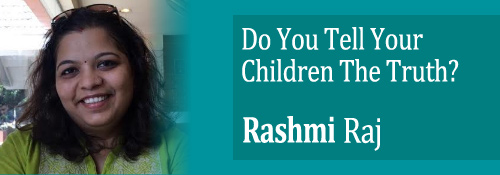Do You Tell Your Children The Truth?
Has your child told his friends that Santa Claus isn’t real? Or that the Tooth Fairy is actually just a mom or a dad trying to make you feel better? Well, mine has. Here’s what happened –
It was Sunday and I was sorting and folding the laundry; when a friend of mine called. Her child was in my little one’s class at school and she wanted to let me know that my little one had told her daughter that the Tooth Fairy was not real and that now her daughter was upset and angry and refused to talk to her!
When I inquired about this with my little one, all he said was “Yeah, I told her the Tooth Fairy was actually only her mom or dad placing the penny under her pillow; that she doesn’t really exist. Why, didn’t you say so yourself?” What could I say? I had.
I have always believed that children should be told the truth at all times, no matter what. An age-appropriate version of the truth, perhaps, but they definitely need to be told the truth. And while I am not the only parent to think this is good; I am also aware that there are several others out there, who do not agree with me. I am often accused of being responsible for making my little one lose his innocence too soon. I have also been blamed for making him talk like an adult at a very young age, making him probably unlikely to make many friends among the kids his own age.
In fact, once when my little one was a toddler, an aunt of mine visited us. At mealtime, when my little one began to fuss around with food, preferring to play with his toy instead of finishing his meal, she promptly took his toy away and hid it, telling my little one that a crow had taken it away! I stood there, holding my breath, waiting for my little one to react; and believe me when I tell you, his reaction was priceless! He went around my aunt, pointed at the toy she held in her hand and kept asking her to give it back!
I was super proud that he was smart enough to see through my aunt’s charade, but as you might have guessed, I was berated by the said aunt for not having taught my little one about the crow trick and was declared to be a misfit mom who would never have her child finish his meals because of this over smartness on my part! The fact that I felt my little one is the better judge of how hungry or full he is; and that he doesn’t need to be force-fed using any ‘trick’ just so he eats the food that he doesn’t really want; obviously meant nothing to her. Even now, every time we speak, she never fails to point out to me how wrong it is on my part to insist on telling my child the truth at all times!

There are several everyday examples like this that are part of our culture, and I am sure, every culture in the world, where children are told what are termed as ‘white lies’, (seemingly) for their own good. Take the case of Santa Claus for example, or even stories about God, or folk tales or even the ‘moral stories for children.’ These are stories that are meant to teach children that good is always rewarded and evil is always punished. I am fine with these, not only because they have morals but also because the child knows that these are stories and the moral is something that he is supposed to take forward with him at all times. According to me, these stories help children keep their innocence and revel in the joys of childhood.
Of course, there are opposing views to this too. For example, some parents would rather tell their children Santa isn’t real, because when the child eventually finds out (and find out he will) the truth, then the child begins questioning everything that has been told to him by his parents all this time!
There is also a third view that says that even though the child finds out later that he was lied to, if the parent is honest enough to let him know why that was done; then the child will feel less cheated and would still be ready to believe.
But most importantly, there is one interesting fact that none of us can ignore – that the ability to distinguish between fact and fiction is an inherent quality that starts in early childhood and increases with age. Psychologists believe that children ‘continually take stock of what those around them believe – and actively assess the uniformity of such beliefs to reach conclusions about the plausibility of various claims.’
This is exactly why I would rather tell my little one the truth. And I have good reason too. According to Virginia Mallin, Little Parachutes’ Resident Psychotherapist, it is very important for a child to be told the truth. To quote, “Being told the truth means for the child that they are worth being open with, that they are seen as capable of dealing with reality, and not fobbed off with deception. And when a parent tells the truth, the parent is modelling that reality can be dealt with, that pain or upset can be got through and emotionally survived. The truth gives us all the chance to deal with life and therefore more chance to move through its difficulties. Being told the truth makes us feel of value, and that builds strength of character” she says.
So then my stand is, that I am happy telling my little one the truth, age appropriate, of course, but the truth.
What about you? Do you tell your child the truth all the time?
Rashmi is a devoted mum and an avid reader. When she is not engrossed in a book or attending to the whims of her spirited offspring, she indulges in creative writing and blogging. She was a lawyer once, much before she surrendered to motherhood and took up writing. Today, she is a regular contributor to lifestyle, parenting and e-learning websites; and has created FindMyRead – a vibrant community of book lovers! To read more from Rashmi, visit her blogs Ramblings et al and Find My Read.


